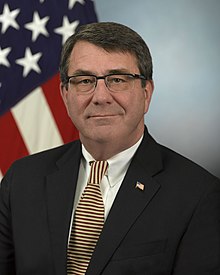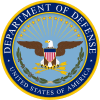Ash Carter
Ashton Carter | |
|---|---|
 | |
| United States Deputy Secretary of Defense | |
| In office October 6, 2011 – December 3, 2013 | |
| President | Barack Obama |
| Preceded by | William J. Lynn III |
| Succeeded by | Christine Fox (Acting) |
| Undersecretary of Defense for Acquisition, Technology and Logistics | |
| In office April 27, 2009 – October 5, 2011 | |
| President | Barack Obama |
| Preceded by | John Young |
| Succeeded by | Frank Kendall |
| Assistant Secretary of Defense for Global Strategic Affairs | |
| In office June 30, 1993 – September 14, 1996 | |
| President | Bill Clinton |
| Preceded by | Stephen Hadley |
| Succeeded by | Jack Crouch (2001) |
| Personal details | |
| Born | Ashton Baldwin Carter September 24, 1954 Philadelphia, Pennsylvania, U.S. |
| Political party | Democratic [citation needed] |
| Spouse(s) | Stephanie Carter (present) Clayton Spencer (Divorced) |
| Alma mater | Yale University St. John's College, Oxford |
Ashton Baldwin "Ash" Carter (born on September 24, 1954) is a physicist and United States Department of Defense official who was nominated by President Barack Obama on December 5, 2014, to replace Chuck Hagel as the United States Secretary of Defense.[1] He was Deputy Secretary of Defense from October 2011 to December 2013, serving as the DOD’s Chief Operating Officer overseeing more than $600 billion per year and 2.4 million civilian and military personnel, and managing global 24/7 operations. From April 2009 to October 2011, he was Undersecretary of Defense for Acquisition, Technology and Logistics with responsibility for procurement of all technology, systems, services, and supplies, bases and infrastructure, energy and environment, and more than $50 billion annually in R&D.
Previously, Carter was a senior partner of Global Technology Partners focused on advising investment firms in technology and defense, and an advisor to Goldman Sachs on global affairs. At Harvard’s Kennedy School, he was Professor and Chair of the International Relations, Science, and Security faculty. He served on the Boards of Directors of the MITRE Corporation, Mitretek Systems, MIT Lincoln Laboratory, and a member of the Draper Laboratory Corporation. Carter has been a member of the Defense Policy Board, the Defense Science Board, and the Secretary of State’s International Security Advisory Board. He was elected a Fellow of the American Academy of Arts and Sciences and is a member of the Council on Foreign Relations and the Aspen Strategy Group.
From 1993 to 1996, Carter served as Assistant Secretary of Defense for International Security Policy, responsible for policy regarding the former Soviet states, strategic affairs, and nuclear weapons policy.
For his service to national security, Carter has on five occasions been awarded the Department of Defense Distinguished Service Medal. He received the Defense Intelligence Medal for his contributions to Intelligence. He was confirmed unanimously by the U.S. Senate for both the number-two and number-three Pentagon positions. Carter is author or co-author of eleven books and more than 100 articles on physics, technology, national security, and management.
On December 5, 2014, Carter was nominated by President Barack Obama to replace outgoing Secretary of Defense Chuck Hagel.[2]
Early life
Ashton Carter was born on September 24, 1954 in Philadelphia, Pennsylvania, the son of Anne (Baldwin) and William S. Carter, Jr., a Navy neurologist and psychologist.[3][4] He was educated at Abington High School in Abington, Pennsylvania, where he had been president of the honor society, and graduated in 1972. He received bachelor's degrees in physics and in medieval history from Yale University, summa cum laude, Phi Beta Kappa in 1976.[5] He then received his doctorate in theoretical physics from the University of Oxford in 1979, where he was a Rhodes Scholar.[5]
During his time in Oxford, around 1977-1979, he was based at St John's College, Oxford working with Christopher Llewellyn Smith, chairman of Oxford Physics, who was a Fellow of the College, and among other duties he served as tutor to physics undergraduates, including Stephen Wolfram who went on to found Mathematica, and Oliver Tickell, currently editor of The Ecologist. He was subsequently a postdoctoral fellow at Rockefeller University and MIT, and an experimental research associate at Brookhaven and Fermilab National Laboratories.
Department of Defense career

Carter served as Assistant Secretary of Defense for International Security Policy during President Clinton's first term.
His Pentagon responsibilities encompassed: countering weapons of mass destruction worldwide, oversight of the U.S. nuclear arsenal and missile defense programs, policy regarding the collapse of the former Soviet Union (including its nuclear weapons and other weapons of mass destruction), control over sensitive U.S. exports, and chairmanship of NATO's High Level Group. Carter directed military planning during the 1994 crisis over North Korea's nuclear weapons program;[6] was instrumental in removing all nuclear weapons from the territories of Ukraine, Kazakhstan, and Belarus;[7] directed the establishment of defense and intelligence relationships with the countries of the former Soviet Union when the Cold War ended; and participated in the negotiations that led to the deployment of Russian troops as part of the Bosnia Peace Plan Implementation Force. Carter managed the multi-billion dollar Nunn-Lugar Cooperative Threat Reduction program to support elimination of nuclear, chemical, and biological weapons of the former Soviet Union, including the secret removal of 600 kilograms of highly enriched uranium from Kazakhstan in the operation code-named Project Sapphire. He also directed the Nuclear Posture Review and oversaw the Department of Defense's (DOD's) Counterproliferation Initiative. He directed the reform of DOD's national security export controls. His arms-control responsibilities included the Agreed Framework which froze North Korea's plutonium producing nuclear reactor program,[6] the extension of the Nuclear Nonproliferation Treaty, the negotiation of the Comprehensive Test Ban Treaty, and matters involving the START II, ABM, CFE, and other arms-control treaties.
In an April 4, 2013, speech at Center for Strategic and International Studies, the Secretary affirmed that the 'Shift to Asia' initiative of President Obama was a priority that would not be affected by the Budget sequestration in 2013 as the Pentagon and other departments scaled down spending. The Secretary responded to a Reuters reporter's question that China was suspicious of the refocusing of American foreign policy to Asia as a military targeting of China by stating that the Chinese should ask the North Koreans to lower their military posturing and resolve to use diplomacy and dialogue to solve their problems. Carter noted that China was a central economic partner and that 'The Shift to Asia' is principally an economic matter with new security implications. India, Australia, and New Zealand were mentioned as forthcoming security partners.[8]
Secretary of Defense nomination
Carter has been nominated by President Obama as the United States Secretary of Defense.[9]
Other roles
Carter had been a longtime member of the Defense Science Board and the Defense Policy Board, the principal advisory bodies to the Secretary of Defense. During the Bush administration, he was also a member of Secretary of State Condoleezza Rice's International Security Advisory Board; co-chair of the Senate Foreign Relations Committee's Policy Advisory Group; a consultant to the Defense Science Board; a member of the National Missile Defense White Team, and a member of the National Academy of Sciences Committee on International Security and Arms Control. In 1997, Carter and former CIA Director John M. Deutch co-chaired the Catastrophic Terrorism Study Group which urged greater attention to terrorism. From 1998 to 2000, he was deputy to William J. Perry in the North Korea Policy Review and traveled with him to Pyongyang.[6] In 2001-2002, he served on the National Academy of Sciences Committee on Science and Technology for Countering Terrorism and advised on the creation of the Department of Homeland Security. He has testified frequently before the armed services, foreign relations, and homeland security committees of both houses of Congress.
In addition to his public service, Carter was a Senior Partner at Global Technology Partners and a member of the Board of Trustees of the MITRE Corporation, and the Advisory Boards of MIT's Lincoln Laboratory and the Draper Laboratory. He has been a consultant to Goldman Sachs and Mitretek Systems on international affairs and technology matters, and speaks frequently to business and policy audiences. Carter was also a member of the Aspen Strategy Group, the Council on Foreign Relations, the American Physical Society, the International Institute for Strategic Studies, and the National Committee on U.S.-China Relations. Carter was elected a Fellow of the American Academy of Arts and Sciences.
Carter was also co-director of the Preventive Defense Project,[10] which designs and promotes security policies aimed at preventing the emergence of major new threats to the United States.
From 1990 to 1993, Carter was director of the Center for Science and International Affairs at Harvard University's John F. Kennedy School of Government, and Chairman of the Editorial Board of International Security. Previously, he held positions at the Massachusetts Institute of Technology, the Congressional Office of Technology Assessment, and Rockefeller University.
Views on Iran
Carter's views on Iran have been perceived as hawkish.[5] In 2006, he authored a report advocating use or threat of force to prevent Iran from obtaining nuclear weapons for the Carnegie Endowment for International Peace.[5] Carter has supported diplomacy with Iran and written about methods of containing a nuclear-armed Tehran. [11]
Personal life
Carter is married to Stephanie Carter. He was previously married to current Bates College President Clayton Spencer. He and his former wife have two grown children.
Works
In addition to authoring numerous articles, scientific publications, government studies, and Congressional testimonies, Carter co-edited and co-authored 11 books, including:
- Directed Energy Missile Defense in Space (1984)
- Ballistic Missile Defense (1984)
- Managing Nuclear Operations (1987)
- Soviet Nuclear Fission: Control of the Nuclear Arsenal in a Disintegrating Soviet Union (1991)
- Beyond Spinoff: Military and Commercial Technologies in a Changing World (1992)
- A New Concept of Cooperative Security (1992)
- Cooperative Denuclearization: From Pledges to Deeds (1993)
- Preventive Defense: A New Security Strategy for America (1997)
- Keeping the Edge: Managing Defense for the Future (2001)
References
- ^ Sara Fischer, CNN (5 December 2014). "Obama nominates Ash Carter to lead Defense - CNN.com". CNN. Retrieved 8 December 2014.
{{cite web}}:|author=has generic name (help) - ^ "Meet Chuck Hagel's expected replacement as Defense Secretary". CNN. December 2, 2014. Retrieved December 2, 2014.
- ^ "Abington recalls 'brilliant' alum said in line to lead Pentagon". Philly.com. Retrieved 8 December 2014.
- ^ "Obituaries". Philly.com. Retrieved 8 December 2014.
- ^ a b c d Rebecca Shimoni Stoil, Obama names Ashton Carter as next defense secretary, The Times of Israel, December 5, 2014
- ^ a b c "Kim's Nuclear Gamble: Interview: Ashton Carter". Frontline. PBS. March 3, 2003. Retrieved June 9, 2009.
- ^ Carter, Ashton B. (September 2004). "How to Counter WMD". Foreign Affairs. Retrieved December 2, 2014.
- ^ "Video: Statesmen's Forum: The Honorable Ashton B. Carter, Deputy Secretary of Defense". Center for Strategic and International Studies. April 9, 2013. Retrieved December 2, 2014.
- ^ "Obama picks former Pentagon official Ashton Carter to be defense secretary". FOXNEWS. December 5, 2014. Retrieved December 5, 2014.
- ^ "ACQWeb - Biography of The Honorable Ashton Carter". osd.mil. Retrieved 8 December 2014.
- ^ Crowley, Michael. "Can a wonk run a war?". Retrieved December 5, 2014.
External links
- Preventive Defense Project
- Ashton B. Carter expert profile at the Belfer Center of Harvard University
- Appearances on C-SPAN
- Collected columns at Foreign Affairs magazine
- Template:Worldcat id
- 1954 births
- American physicists
- American Rhodes Scholars
- Arms control
- Arms control people
- Clinton Administration personnel
- John F. Kennedy School of Government faculty
- Living people
- Mitre Corporation people
- Obama Administration personnel
- People from Philadelphia, Pennsylvania
- United States Deputy Secretaries of Defense
- Yale University alumni


